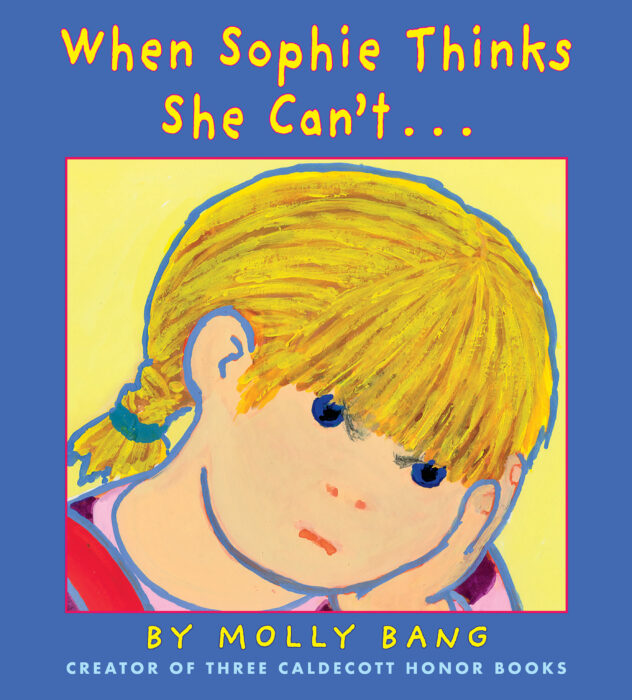
When Sophie Thinks She Can’t
Written and illustrated by Molly Bang
Blue Sky Press, 2018, 32 pp
ISBN: 978-1338152982
When Sophie Thinks She Can’t introduces the power of YET to support children’s growth mind set and the importance of productive struggle through the lens of thinking like a mathematician. We are re-introduced to the main character, Sophie, whom we know from other titles, When Sophie gets Angry – Really, Really Angry (2004) and When Sophie’s Feelings are Really, Really Hurt (2015). In this story set in the U.S, blond-haired Sophie struggles because she doesn’t view herself as smart. Sophie’s teacher encourages her diverse classroom of students (in both race and ability) to share their beliefs about what smart means. “What’s the ONE word on the board? SMART. ‘How do we become smart?’ asks Ms. Mulry. Nobody knows the answer. They all think you have to be born smart.”
The power of YET is leveraged in this story as a way to think beyond what students think they can’t do when it comes to mathematical problem solving. “Now’s the time to use the Most Important Word. That word is… YET. You haven’t figured it out…. YET. Keep working! Keep trying, and you will.” This story illustrates what happens to Sophie when she feels the uncertainty, fear, and anxiety of not knowing how to solve a problem, YET. Creating an environment and attitude of a growth-mindset in the classroom is the main theme of this story, which focuses on the power of YET as a way of learning through productive struggle. Hansen (2011) encourages teachers to support students by being open to learning the new in this complicated world. Sophie explores the new in her learning and grows because of moving beyond her struggles. By the end of the story, she takes this learning-mindset home to her father by helping him with a problem he thinks he can’t solve.
Molly Bang portrays the struggle that Sophie encounters by exploring difficult tasks. Other books that look at struggle through the power of YET include Jabari Jumps (Cornwall, 2020) and Flight School (Judge, 2014). These stories can be reconstructed by looking at the texts through a mathematical lens. Other books in which the story can be reframed so the reader is encouraged to think like a mathematician (Muhammad, 2020) are Where the Wild Things Are (Sendak,1964) where students explore time; A Squash and a Squeeze (Donaldson, 2016) can be used to explore special relationships; Grapes of Math (Tang, & Briggs, 2004) can be used for creative problem solving.
Bang, who has three Caldecott honor books, illustrates this latest Sophie story in the same expressionistic artistic style as her other two stories using gouache in lively, brilliant paintings. Of particular interest is how she uses an illustrated text font to indicate the struggles that Sophie feels. “I can’t” is portrayed in a huge, expressive font highlighted with jagged edges to indicate frustration. You also see the frustration when Sophie indicates that she is “NEVER smart at MATH.” The mathematical symbols are illustrated in a very distorted view to portray Sophie’s frustration at not understanding the problem. Bang’s unique illustrations of the font support the main theme of overcoming struggle.
In the backmatter of the book, Bang acknowledges Dr. Ann Stern who teaches growth mindset to teachers and who encouraged Bang to write this book. In the past 10 to 15 years, Bang has become concerned with children’s lack of knowledge about scientific principles and has collaborated on science themes with MIT Professor of Ecology, Penny Chisholm. These books include Rivers of Sunlight (2017) and Buried Sunlight (2014).
References
Hansen, D. (2011). The teacher and the world: A study of cosmopolitanism. Routledge.
Muhammad, G. (2020). Cultivating Genius: An equity framework for culturally and historically responsive literacy. New York: Scholastic.
Kathleen Crawford-McKinney and S. Asli Özgün-Koca, Wayne State University
© 2021 by Kathleen Crawford-McKinney and S. Asli Özgün-Koca

WOW Review, Volume XIV, Issue 2 by Worlds of Words is licensed under a Creative Commons Attribution-NonCommercial-ShareAlike 4.0 International License. Based on work by Kathleen Crawford-McKinney and S. Asli Özgün-Koca at https://wowlit.org/on-line-publications/review/xiv-2/10/
